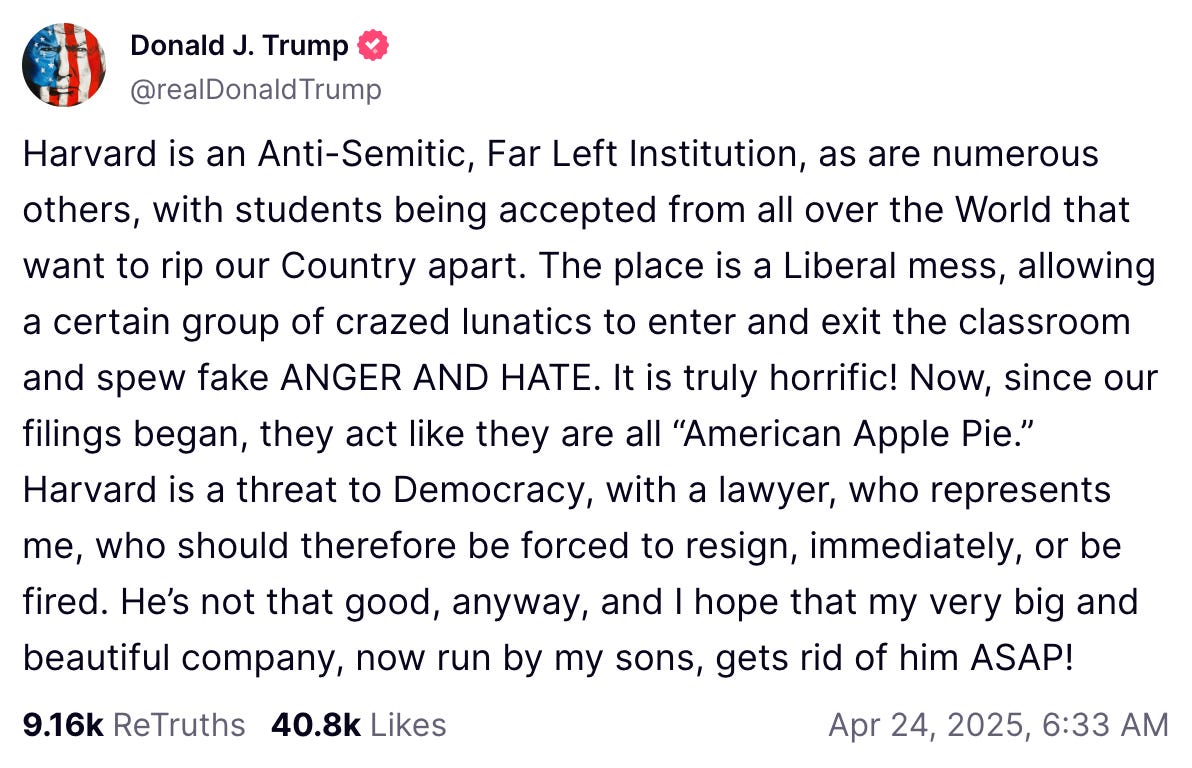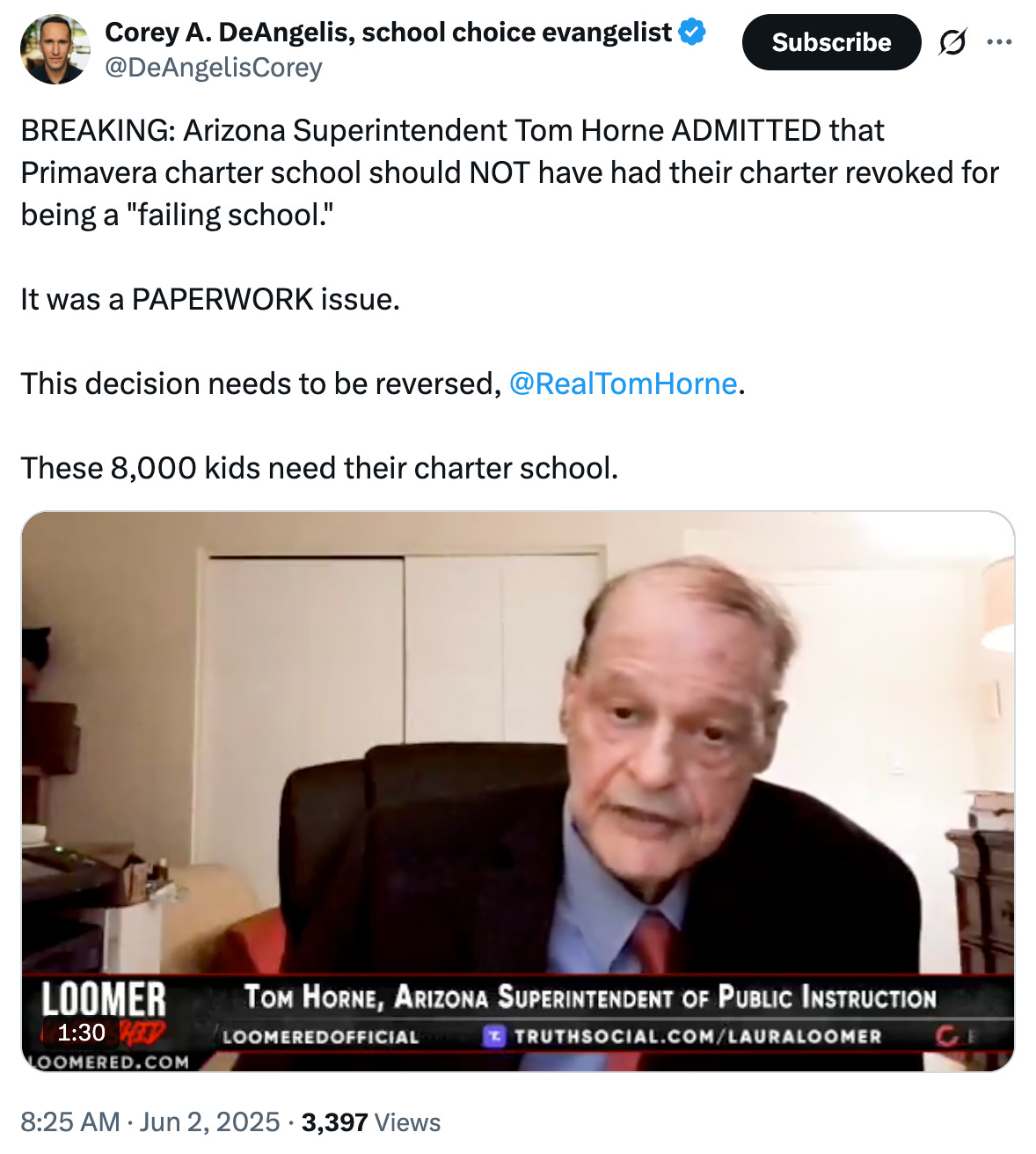Summer school for regents
You can’t say that word anymore … He quoted MLK … And hearing from the governor herself.
Hey readers!
School may be out, but it’s not exactly summer break in the world of Arizona education policy.
The Arizona Board of Regents is about to approve budgets for the state’s three universities, and scrub its policies of any mention of “minorities,” “diversity,” “affirmative action,” or any other terms that might offend the Trump administration.
Meanwhile, the state Legislature is about to adopt a budget that will decide how much money schools have to spend — and some are still holding out hope of asking voters to protect school vouchers in the state constitution.
Plus, more drama in West Valley schools and much more.
Let’s get into it…
But first, click the button to support local news.
The Arizona Board of Regents is scheduled to adopt budgets for the three state universities this week, and to tackle a host of policy changes inspired by the Trump administration.
First up, universities are asking ABOR to approve their budgets for the upcoming year, a roughly $8 billion exercise in balancing priorities and ledgers.
But as the university system is quick to note, only about 12% of that funding comes from the state — the largest portion of the money the universities have to spend comes from tuition, which has skyrocketed in the last decade.
And while state support for universities has increased in recent years, funding is still below 2008 levels. And overall funding for the state’s university system represents a shrinking percentage of the overall state budget — meaning a shrinking priority for state lawmakers.
Student enrollment is steadily growing at ASU, fueled by online students. But full-time students are expected to drop slightly at UA and ASU.
And while ASU is predicting a slight increase in international student enrollment, UA and NAU are both predicting drops — by 4% and 23%, respectively.
ABOR notes that the greatest number of international students come from China, India and Middle Eastern nations.
On the bright side, revenues are up 6% systemwide.
However, that revenue growth isn’t uniform.
ASU estimates a 9% increase, mostly coming from tuition and fees, and financial aid grants.
At UA, they’re looking at a 4% revenue increase, mostly from federal aid grants.
But at NAU, they’re looking at a 2% decrease in revenue. Tuition and fee revenue, general fund appropriations and grants and contracts are all down.
And UA is still digging itself out of a massive financial hole caused by a serious “miscalculation” of its cash on hand in 2023.
While ASU and NAU each have more than 160 days’ cash on hand in the bank, UA is still far below the target range, projecting just 77 days’ worth of cash on hand at the end of the next fiscal year.
But all of that budgeting is dependent on state lawmakers adopting a spending plan that doesn’t further harm the university system.
And, of course, it assumes that none of Arizona’s universities find themselves in President Donald Trump’s crosshairs.
Breaking out the thesaurus
The federal government is the largest funding source for Arizona’s public universities, and to make sure they don’t draw Trump’s ire, universities have been updating their policies to eliminate any mentions of diversity, equity or inclusion or any of the other trigger words that might get them in trouble.
And ABOR is following suit, amending policies to comply with Trump’s January executive order “Ending Illegal Discrimination and Restoring Merit-Based Opportunity.”
Board policies already expressly require universities to comply with federal and state laws prohibiting discrimination, ABOR notes.
“However, several policies can be clarified to remove outdated references to revoked federal requirements and more clearly describe the Board and universities’ continued compliance with state and federal laws prohibiting discrimination and ongoing commitment to providing access to post-secondary attainment for all Arizonans.”
At this week’s meeting, ABOR is planning to eliminate from its policies any mention of “affirmative action.” References to “minority students” will become “underrepresented students.” And “diversity” will henceforth be known as “differentiation.”
Enemies, foreign and domestic
And as Trump targets anti-Israel protests on college campuses, ABOR is about to amend its rules prohibiting student groups from supporting terrorist organizations.
ABOR already has standard rules prohibiting supporting foreign terrorist organizations — but now it’s adding “domestic terrorist organizations,” as defined under federal law.
A few years back, during the Black Lives Matter protests following the murder of George Floyd by police, Trump wanted to designate “Antifa” as a domestic terrorist organization.
Georgia Congresswoman Marjorie Taylor Green introduced a bill this year to make it happen.
These days, even FBI agents are worried that the agency could use that designation to crack down on political opposition.
Curbing campus doxxing
Finally, ABOR is also looking to add a policy to explicitly prohibit handing out student information to people trying to doxx them.
Doxxing, for the uninitiated, is the practice of posting someone’s personal information — like home address or phone number — with the intent to harass them. That information is usually a matter of public record through the university’s director, unless students opt out.
The new policy, which, like the domestic terrorism policy, was brought up by the Arizona Faculties Council before Trump won a second presidency, seemingly in response to threats and harassment among students debating Israel’s war on Gaza.
But the proposed policy specifically notes that it doesn’t attempt to limit access to public records.
“Because doxxing can lie close to speech protected under the First Amendment, the New Anti-Doxxing policy is narrowly drafted to prohibit behavior that is not protected speech,” per ABOR.
A new student member of the Arizona Board of Regents that Gov. Katie Hobbs nominated in January made it through the Senate Education and Transportation Committee’s vetting process and is heading to the full Senate for confirmation.
But first, UA student Felipe Jose Garcia had to smile politely while listening to quite the rant from the committee’s chairman, Sen. David Farnsworth.
Farnsworth started off with some friendly banter about how he’s the chair of the Senate’s education committee, yet he doesn’t have a college degree and he has dropped out of college several times “for lack of money primarily.”
But then it took a weird turn. Take a listen — we bookmarked the clip for you.
The short version is: Farnsworth explained that, at one point, he went back to school to become a teacher, but he had to take a required diversity course. That was enough to dissuade him from pursuing the degree.
“I think understanding diversity in our world is really, really important, because we have had real racial problems years ago. Now, growing up in Arizona, quite frankly, I never really identified a problem, except, quite frankly, reverse discrimination when I tried to get a job here in Arizona,” he said.
He complained that the required book called white men WASPs (White Anglo-Saxon Protestants) and “indoctrinated” future teachers while promoting division and discrimination against white people.
“I believe Martin Luther King Jr. said it well — I can't quote him, but you know what he said: I Look forward to a day when people will appreciate us for the quality of our character, not the color of our skin, and so forth,” Farnsworth said. “So in society, we tend to recognize challenges, and we work on those challenges, and sometimes the pendulum swings too far in the other direction. And we have to do a course correction, bring us back.”
He asked Garcia if he would be willing to meet and read through the book together.
Like a good future politician, Garcia was noncommittal.
Nope: Gov. Katie Hobbs vetoed legislation championed by Tucson Democrat Alma Hernandez that would have let parents sue public school teachers personally over alleged “antisemitic conduct.” As an example, Hernandez said she saw a local school with a Palestinian flag in a classroom window.
“Unfortunately, this bill is not about antisemitism; it's about attacking our teachers,” Hobbs wrote in her veto letter. “It puts an unacceptable level of personal liability in place for our public school, community college, and university educators and staff, opening them up to threats of personally costly lawsuits.”
Interesting pairing: Superintendent of Public Instruction Tom Horne and Maricopa County Sheriff Jerry Sheridan are hosting a joint press conference at 11 a.m. today to “address parental complaints regarding an unbalanced leftist curriculum being imposed upon students at Scottsdale Unified School District.” It’s unclear why he needs the Sheriff there, other than to discuss “possible implications for the … law enforcement community if attempted indoctrination continues.”
We’ll pay you back: Schools are bracing for another round of cuts, the Republic’s Mary Jo Ptizl reports, after a lawsuit settlement, voucher growth, higher public school enrollment than expected and a handful of other factors led to a more than $200 million shortfall. For June, public district and charter schools expect to get only about 60% of their regular monthly distribution. Lawmakers are planning to backfill those funds in the state budget, assuming they adopt one.
Speaking of budgets: The Arizona Agenda’s Nicole Ludden got hold of some preliminary budget documents that Republicans in the state House are shopping ahead of their planned budget rush this week. Senate Republicans say they haven’t seen the documents and, unlike their House counterparts, they’re negotiating with the governor. It’s unclear if some sort of Prop 123 renewal, with or without voucher protections, is part of that negotiation.
Speaking once again of budgets, if you like the Education Agenda, you can help fund it by clicking this button.
At least school’s out: Arizona has its first measles cases of the year. Navajo County reported four cases on Monday from non-vaccinated people that officials say came from a single source, the Republic’s Stephanie Innes writes. Arizona parents and guardians have growing “personal beliefs,” at least when it comes to immunizations, as more choose to opt their students out of one or more vaccines, report Republic writers Innes and Caitlin McGlade. Data from the Arizona Department of Health Services shows exemptions have nearly doubled over the past decade to around 10% of students without one of their immunizations. Meanwhile, Health Secretary Robert F. Kennedy Jr. removed every member of a CDC committee on immunization practices because “a clean sweep is needed to re-establish public confidence in vaccine science,” per the Associated Press.
Seating is everything: Former Superintendent of Public Instruction Diane Douglas penned an oped for the Arizona Daily Independent celebrating the fact that the (hired) superintendent of the Peoria Unified School District, where Douglas once served, no longer sits at the dais with the (elected) school board members.
“(Sitting at the dais) implies the employee is equal to the elected officials. Whether intended or not, this demeans the elected office,” she wrote.
But a D is a passing grade!: The State Board for Charter Schools is continuing to take steps to close Primavera online schools after the nonprofit company showed years of poor performance as its owners earned millions, the Republic’s Alexandra Hardle reports. The charter school has become a cause célèbre for MAGA Republicans, and the company’s lawyer recently sent a letter to the board saying it should have received a C grade, rather than a D, this year. But it was their third D in a row and the board was unimpressed. Next stop is to hear the case before an administrative law judge, then vote on whether to accept their recommendation.
Get educated: Education Secretary Linda McMahon didn’t have answers to the pretty basic questions that members of Congress had for her when she testified before a House subcommittee last week, the Guardian reports. She was stumped by questions like: Would teaching about the Tulsa race massacre and Ruby Bridges violate President Donald Trump’s anti-DEI policies? Or even, what is the Tulsa race massacre and who is Ruby Bridges? She vaguely offered that if teachers offer “both sides” of those events, it would probably be ok.
Racking up debts: The Cartwright school board is demanding that members Denise Garcia and Anna Abeytia (who is also a state lawmaker) repay the district for using a subsidized child care program that is for teachers, the Republic’s Ray Stern writes. Garcia and Abeytia were part of the majority of the board who voted to allow board members to use the program back in 2023, but doing that would violate the state Constitution’s gift clause, according to a lawyer the school board hired. Separately, Abeytia is facing an investigation from the Arizona Clean Elections Commission over spending almost all of her public campaign finances on her fiancé’s consulting company — with no receipts.
"If it's a debt, I have to pay. Then I got to be responsible, right?" Garcia said.
Thanks to this week’s sponsor, RiseAZ!
RiseAZ supports policies that support skilled infrastructure workers — you can learn more about their campaign here.
It’s time to fix Arizona laws to improve government accountability, so that major public infrastructure projects are done safely, with highly-skilled workers and public oversight.
We need these projects done once, and done right by creating:
1. Properly-skilled construction workers, paid fairly to do the difficult and dangerous jobs they are trained to do
2. Heat safety and other safe working conditions
3. Oversight and accountability for government-funded projects
Join RiseAZ today in championing our infrastructure, our working families, our industries and economy, and our future.
Build it Once, Do it Right
If you’d like to sponsor an edition of the Education Agenda, get in touch!
More than 100 students from across the country are participating in the Sandra Day O’Connor Institute for American Democracy’s Camp O’Connor, a five-day program that lets future eighth- and ninth-graders learn about government.
Yesterday, they even got a chance to hear from and ask questions of Gov. Katie Hobbs, Cronkite News’ Travis Bradley reports.
“Get involved, figure out what you want to do and just go do it,” Hobbs told the students.
California middle school student Taylor Lee, told Bradley that the real-world experience and interactions with leaders was very different from sitting in a classroom.
“You get to learn a lot more about your interests while being around like-minded people,” said Lee, who hopes to one day join the Judge Advocate General’s Corps, the military’s legal branch.













